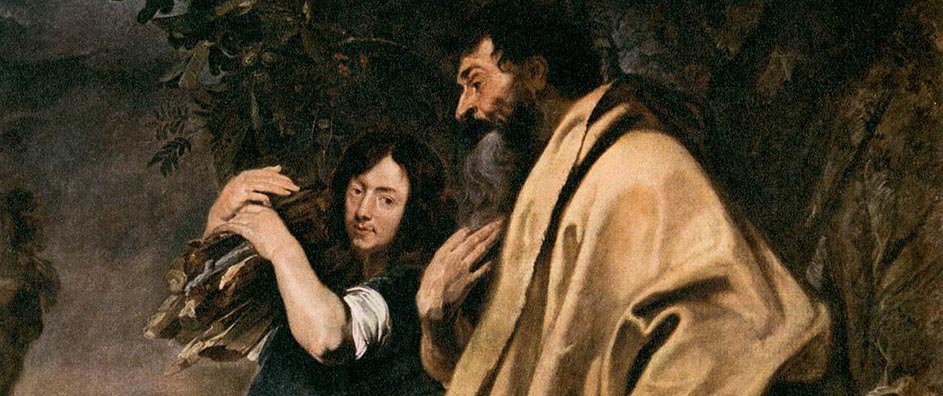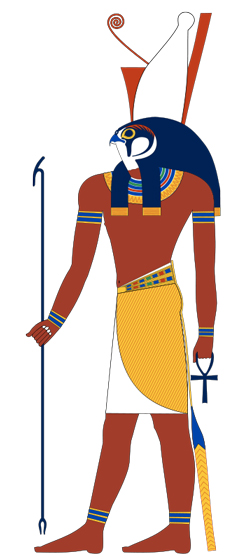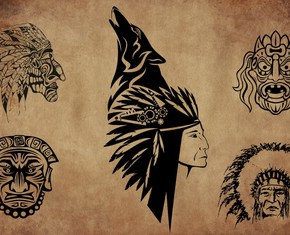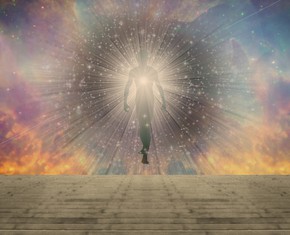The views expressed in our content reflect individual perspectives and do not represent the authoritative views of the Baha'i Faith.
Jewish tradition describes Abraham’s first eye-opening experience of idol breakage as happening when Terah sent Abraham to sell idols in the streets of the city. The boy loaded the family mule with idols and headed for an inn where a group of Syrian merchants stayed. He hoped he could interest them in buying the idols for resale in Egypt. Just as Abraham reached the inn, a camel belched loudly enough to frighten the mule, which broke away and ran off.
In the resulting tumult, three valuable idols were broken, ruining Abraham’s chance to make a profit and impress his father with his business acumen.
After the mule had been recaptured, Abraham straddled it and began riding home, reflecting as he rode on how totally helpless the idols had been. Ironically, Abraham’s father, Terah, was more powerful than the gods he created. “Is not he the god of his gods,” Abraham asked himself, “for do they not come into being by reason of his carving and chiseling and contriving?”
Whether the incident of the belching camel and the runaway mule was the catalyst or not, both tradition and scripture indicate that Abraham began asking penetrating questions about spiritual reality while still quite young. He and his family were, according to the Baha’i writings, members of the ancient Sabean religion, but the answers he found within that faith evidently didn’t satisfy him.
As soon as Abraham began drawing independent conclusions about the nature of reality, he began acting in ways that surprised his comrades, infuriated his father, and ultimately transformed him into that rising star feared by Nimrod.
As soon as the young Abraham became convinced that idols had no power, he began sharing that realization with his father. When Terah turned away, refusing to listen to his arguments, Abraham adopted a more dramatic form of persuasion.
One day Terah was called away on business, leaving Abraham to mind the store. While he was on duty, a pious woman dropped by. She was carrying a handful of flour as an offering for the idols, and she spread it out in front of them so that they might eat it. Abraham responded courteously to the generosity of the woman and managed to refrain from pointing out the foolishness of her actions, but after she left, he grabbed a hammer and began energetically swinging it. With a blow here and a blow there, Abraham managed to smash all of the idols, except one, to bits. He left the largest idol intact and put the hammer in its hand.
When Terah returned and discovered the damage, he was livid. What was the name, he demanded, of the madman who had ransacked the store?
Abraham responded that a woman had come in with an offering of flour, and that when the gift was set in front of the idols, they started arguing. The greediest god irritated the others by announcing, “I will eat first.” This caused a second god to protest, saying, “No, I will eat first!” The disagreement escalated until the biggest of them all stood up, grabbed a hammer and crushed the others to dust.
Terah stared at his son in disbelief. “Are you trying to fool me?” he asked. “These idols don’t know anything.” Abraham quietly replied, “Do your ears not hear what your mouth has just said?”
Terah refused to be impressed by this performance, but Abraham remained adamant in his beliefs. Eventually he began speaking about those heretical beliefs to people outside the family, directing them to abandon idols, renounce polytheism, and “Serve the God of all gods, the Lord of lords, who hath created heaven and earth, the sea and all therein.”
Abraham’s vibrant rejection of polytheism and idol worship startled those around him, in spite of the fact that His ideas rested on a spiritual foundation built by the Prophets who preceded him. Step by step, the Prophets Adam, Seth, Enoch, Noah, and others had led mankind along a divine path intended to gradually move people away from worshipping the visible and limited, and lead them toward an appreciation of the unseen and unlimited. These Messengers had emphasized basic moral concepts and explained the difference between good and evil. They had also established the existence of a god who was greater than any of the others, and he had been adopted by many cultures under a variety of names, including El, An, Il, and Horus.
One thing that previous Messengers had not yet done (as far as historians can determine) was to proclaim an end to polytheism and introduce monotheism. Nor, it seems, had they forbidden idols. This was not a careless oversight on their part but a necessary strategy based on the spiritual capabilities of human beings. The Baha’i writings explain:
Just as the organic evolution of mankind has been slow and gradual, and involved successively the unification of the family, the tribe, the city-state, and the nation, so has the light vouchsafed by the Revelation of God, at various stages in the evolution of religion, and reflected in the successive Dispensations of the past, been slow and progressive. Indeed the measure of Divine Revelation, in every age, has been adapted to, and commensurate with, the degree of social progress achieved in that age by a constantly evolving humanity. – Shoghi Effendi, The Promised Day is Come, p. 118.
Abraham’s gigantic task would be to explain that the high god he described was the only God, and that it was impossible to contain God in an idol or accurately represent him with a graven image. In pursuit of this goal, Abraham would find, as did others before and after him, that the mantle of Prophethood does not rest lightly on the shoulders of those who must bear it. Opposition and persecution, along with ridicule and contempt, are their constant companions.
You May Also Like
Comments


















https://quran.com/4/125